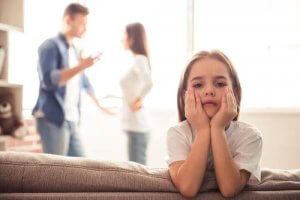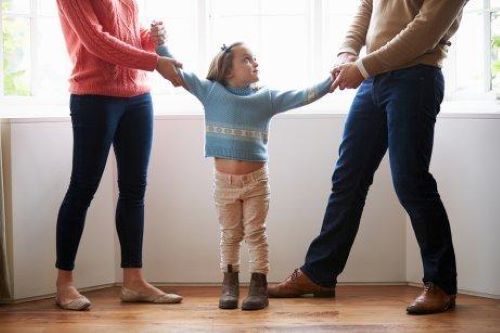Talking About Divorce with Children

How can you go about talking about divorce with children? We’re led to believe in society today that successful relationships never end. Once you find the love of your life you should be together forever.
It’s not easy to come to the realization that a separation from your spouse is necessary. It’s an even harder decision if there are children involved.
Explaining to children why mom and dad will no longer live under the same roof and that they’ll take separate paths is a painful experience. It has to be handled with a lot of composure from all parties.
It’s of vital importance that the children know they’ll always have the love of their parents. That is unbreakable and will never change.
It’s true that divorce is a difficult moment for both spouses as they’re facing the pain of loss and a feeling of failure at the same time. However, children can sense when parents are externalizing these emotions, and it’s very likely to affect them.
This situation can generate rebellious behavior, sadness, or a feeling of guilt in children.
Repercussions in children’s behavior
There are increasingly more children who suffer from the repercussions of divorce, year after year. The reactions form this life-changing event can manifest differently depending on their age, maturity, and personality.
Talking about divorce with children is no easy task; it’s the beginning of the end of the only life they know, and, thus, it will affect their way of behaving.
The children experience a wide range of feelings that can include shock, guilt, sadness, frustration, anger, and confusion. They can even come to worry about the uncertainty of their future. They’re seeing what they thought was the fundamental pillar of their lives crumble.
This could bring negative reactions in different scenarios, like for example adopting an aggressive attitude or experiencing setbacks in terms of academic achievements.
Children of divorcing parents might also show a loss of interest in athletics, they may isolate themselves, and also make drastic changes in their friendships. All of these are clear signs that the child is struggling with the situation.

Nonetheless, contrary to what you might think, this process can also be non-traumatic because there are many ways of talking about divorce with children.
If we choose to have the right kind of conversations, divorcing parents can have a positive impact on their children. They’ll see that change is perfectly acceptable in the dynamic of their lives. This will make them more tolerant and flexible in the face of adversity.
How to help children in the process of divorce?
Whether the child’s experience is abrupt or not depends a lot on how the parents handle the situation. We need to put our own needs aside, despite how hard that is. It’s important to concentrate on the children. That way they can face this process with the least pain and sadness possible.
When it comes to talking about divorce with children, the recommendation is that both parents come to an agreement, even if it’s only temporary. It’s crucial that you stop the personal disputes so the children can see that they’re a priority in your life and that your affection for them won’t change.
Both parents should be present when you first tell the children about the separation. You should explain as a couple that you don’t love each other like before and that you’ll live apart, but that you’re still good friends.
However, it’s fundamental to provide children with all the information necessary. It needs to be presented in a way that is understandable and suitable for their age.
In this way, they’ll feel secure and prepared for the changes still to come. This will help reduce anxiety, concerns, and worry knowing they can still count on their parents for everything they need.
“The span of emotions that children experience in this situation can include shock, a feeling of guilt, sadness, frustration, anger and confusion.”
Recommendations for talking about divorce with children
Making this news less painful for children depends on how the adults handle it. The decision has been made and transmitted, but the process is still beginning, so everything will have to be treated delicately.
When it comes to talking about divorce with children, the following advice is recommended:
- Avoid discussing your irreconcilable differences in front of the children.
- Discuss the legal aspects of the divorce when the children aren’t present. Keep them out of this part of the matter.

Keep the children’s schedules in equilibrium as much as possible. Both parents need to prioritize the children’s activities and get them to and from places on time. That way they can feel like their lives continue in the same way as before, despite the separation.
Refrain from making negative comments about your ex-partner. Although you need an outlet for your emotions and resentments, you should lean on other friends and family for that, not your children.
In conclusion, don’t allow situations that should be handled exclusively by adults to negatively affect your children. It’s entirely the parents who took the decision to separate.
For the children, their family remains the same in spite of facing this new reality. Try to prevent drastic changes in the day-to-day dynamics so that their mood and emotions aren’t affected.
How can you go about talking about divorce with children? We’re led to believe in society today that successful relationships never end. Once you find the love of your life you should be together forever.
It’s not easy to come to the realization that a separation from your spouse is necessary. It’s an even harder decision if there are children involved.
Explaining to children why mom and dad will no longer live under the same roof and that they’ll take separate paths is a painful experience. It has to be handled with a lot of composure from all parties.
It’s of vital importance that the children know they’ll always have the love of their parents. That is unbreakable and will never change.
It’s true that divorce is a difficult moment for both spouses as they’re facing the pain of loss and a feeling of failure at the same time. However, children can sense when parents are externalizing these emotions, and it’s very likely to affect them.
This situation can generate rebellious behavior, sadness, or a feeling of guilt in children.
Repercussions in children’s behavior
There are increasingly more children who suffer from the repercussions of divorce, year after year. The reactions form this life-changing event can manifest differently depending on their age, maturity, and personality.
Talking about divorce with children is no easy task; it’s the beginning of the end of the only life they know, and, thus, it will affect their way of behaving.
The children experience a wide range of feelings that can include shock, guilt, sadness, frustration, anger, and confusion. They can even come to worry about the uncertainty of their future. They’re seeing what they thought was the fundamental pillar of their lives crumble.
This could bring negative reactions in different scenarios, like for example adopting an aggressive attitude or experiencing setbacks in terms of academic achievements.
Children of divorcing parents might also show a loss of interest in athletics, they may isolate themselves, and also make drastic changes in their friendships. All of these are clear signs that the child is struggling with the situation.

Nonetheless, contrary to what you might think, this process can also be non-traumatic because there are many ways of talking about divorce with children.
If we choose to have the right kind of conversations, divorcing parents can have a positive impact on their children. They’ll see that change is perfectly acceptable in the dynamic of their lives. This will make them more tolerant and flexible in the face of adversity.
How to help children in the process of divorce?
Whether the child’s experience is abrupt or not depends a lot on how the parents handle the situation. We need to put our own needs aside, despite how hard that is. It’s important to concentrate on the children. That way they can face this process with the least pain and sadness possible.
When it comes to talking about divorce with children, the recommendation is that both parents come to an agreement, even if it’s only temporary. It’s crucial that you stop the personal disputes so the children can see that they’re a priority in your life and that your affection for them won’t change.
Both parents should be present when you first tell the children about the separation. You should explain as a couple that you don’t love each other like before and that you’ll live apart, but that you’re still good friends.
However, it’s fundamental to provide children with all the information necessary. It needs to be presented in a way that is understandable and suitable for their age.
In this way, they’ll feel secure and prepared for the changes still to come. This will help reduce anxiety, concerns, and worry knowing they can still count on their parents for everything they need.
“The span of emotions that children experience in this situation can include shock, a feeling of guilt, sadness, frustration, anger and confusion.”
Recommendations for talking about divorce with children
Making this news less painful for children depends on how the adults handle it. The decision has been made and transmitted, but the process is still beginning, so everything will have to be treated delicately.
When it comes to talking about divorce with children, the following advice is recommended:
- Avoid discussing your irreconcilable differences in front of the children.
- Discuss the legal aspects of the divorce when the children aren’t present. Keep them out of this part of the matter.

Keep the children’s schedules in equilibrium as much as possible. Both parents need to prioritize the children’s activities and get them to and from places on time. That way they can feel like their lives continue in the same way as before, despite the separation.
Refrain from making negative comments about your ex-partner. Although you need an outlet for your emotions and resentments, you should lean on other friends and family for that, not your children.
In conclusion, don’t allow situations that should be handled exclusively by adults to negatively affect your children. It’s entirely the parents who took the decision to separate.
For the children, their family remains the same in spite of facing this new reality. Try to prevent drastic changes in the day-to-day dynamics so that their mood and emotions aren’t affected.
All cited sources were thoroughly reviewed by our team to ensure their quality, reliability, currency, and validity. The bibliography of this article was considered reliable and of academic or scientific accuracy.
- Amato, P.; Keith, B. (1991). Parental divorce and the well-being of children: A meta-analysis. Psychological-Bulletin, 1991 Jul; 110 (1): 26-46
- Caplan, G. (1993). Prevención de los trastornos psicológicos en los hijos de padres divorciados. En: Caplan, G. Aspectos preventivos en salud mental. Barcelona: Paidós.
- Garin, P. B. (1992). Un análisis exploratorio de los posibles efectos del divorcio en los hijos. Psicothema, 4(2), 491-511.
- Salvador, G. P., & Del Barrio, V. (1995). El efecto del divorcio sobre la ansiedad de los hijos. Psicothema, 7(3), 489-497. https://www.redalyc.org/pdf/727/72707302.pdf
- Shaw, D. (1991) The Effects of divorce on children’s adjustment. Behavior Modification, 15(4), 456-485.
- Testor, C. P., Pujol, M. D., Vidal, C. V., & Alegret, I. A. (2009). El divorcio: una aproximación psicológica. Universidad Ramon Llull, 2, 39-46. https://www.researchgate.net/profile/Carles_Testor/publication/242775375_El_divorcio_una_aproximacion_psicologica/links/54e43ae50cf282dbed6ea7ba/El-divorcio-una-aproximacion-psicologica.pdf
This text is provided for informational purposes only and does not replace consultation with a professional. If in doubt, consult your specialist.








